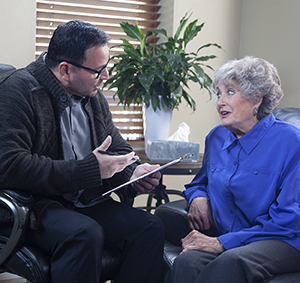Treating Aphasia
Aphasia is a language disorder that happens when a part of the brain that processes language is damaged. Most people who have a stroke or a brain injury are tested for aphasia. An expert trained in speech rehab (speech-language therapist) will work closely with the person. The main goal of speech-language therapy is to help the person communicate. During rehab (rehabilitation), the therapist works to find and increase the person’s strengths. The therapist also tries to improve understanding between the person and their family.

Testing word use
The speech-language therapist wants to know if the person understands questions and can answer correctly. The person may be asked to answer yes-or-no questions, to say their name, and to name common objects. If the person responds easily, the therapist listens for problems with speech patterns and content. The person may also be asked to follow instructions. For instance, the person may be told, “Open the book to page 5.” In some cases, reading, writing, and math skills may also be tested.
Improving communication
Rehab will focus on helping the person use and understand language again. Working with flash cards may help improve word skills. The person may also be asked to name objects or find opposites. A speech-language therapist will help the person find ways to work around lost language skills. In some cases, the person may need to use a thumbs-up signal or eye blinks in place of saying yes or no. The family is often included in this part of rehab. Talk with the speech-language therapist about specific ways of working with your loved one.
Helping your loved one
If your loved one has aphasia, try these tips:
-
Praise any effort at speech that the person makes.
-
Try to understand made-up words that hold meaning for the person.
-
Speak slowly and clearly.
-
Use common words. But don’t talk down to the person.
-
Speak in simple sentences. Stick to 1 idea and 1 action.
-
Ask questions that can be answered with a yes or no.
-
Give the person time to understand and to respond.
-
Try not to speak for the person unless it's necessary.
-
Keep the person informed and involved. Don't speak as if the person isn’t there.
Online Medical Reviewer:
Heather M Trevino BSN RNC
Online Medical Reviewer:
Marianne Fraser MSN RN
Online Medical Reviewer:
Shaziya Allarakha MD
Date Last Reviewed:
9/1/2024
© 2000-2025 The StayWell Company, LLC. All rights reserved. This information is not intended as a substitute for professional medical care. Always follow your healthcare professional's instructions.